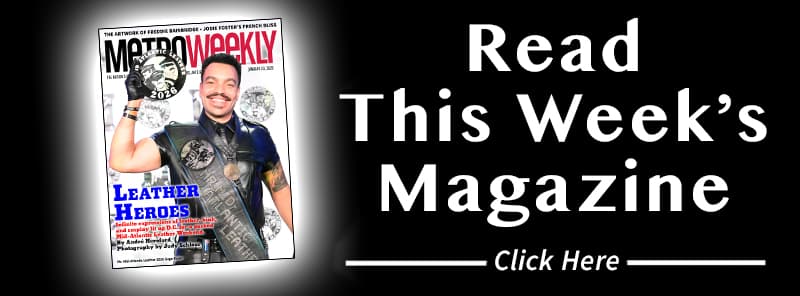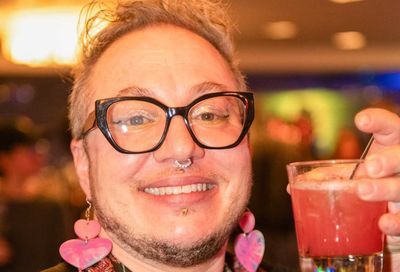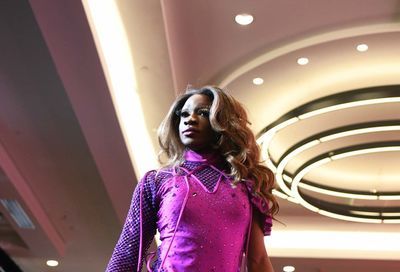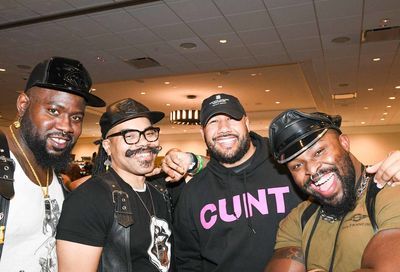SMYAL Like You Mean It
The organization advocating for LGBTIQ youth turns another corner with Bruce Weiss at the helm
The Mayflower Hotel ballroom can be an intimidating place for public speaking, with its florid walls, formal architecture and, of course, a full-size buzzing crowd gathered for last Sunday’s annual Sexual Minority Youth Assistance League Brunch.
But the crowd hushed as SMYAL youth past and present took to the podium to share their own stories of the organization, how they came to find it, what it meant and means for them as young gay, lesbian, bisexual or transgender people. They paint a picture of SMYAL as the safe haven that gave them the courage to be who they are, and the knowledge that they can be who they are.
SMYAL has a formidable history behind it. Founded more than 20 years ago as an activist response to the incarceration of a number of young gay men at St. Elizabeth’s hospital for gender non-conformity, SMYAL has blazed a trail for both the city and nation in advocating for the unique needs of gay, lesbian, bisexual, transgender, intersex and questioning youth.
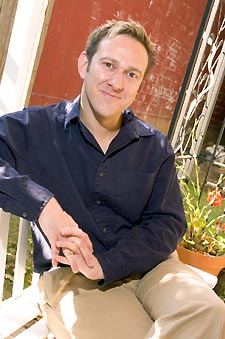 Bruce Weiss |
Those stories and experiences are what keeps SMYAL’s executive director Bruce Weiss at the helm. Just over two years since he joined the organization, SMYAL seems to be turning a corner, rebounding from a series of financial and organizational problems and representing its mission to the community at large. As Weiss noted while speaking to the assembled crowd on Sunday, while so much has changed, some things have stayed the same. Twenty years ago, advocates fought for the youths forcibly imprisoned in mental hospitals. Today, advocates fight for youths forced into ”reparative therapy” programs.
Weiss, 38, is eager to talk about the changes at SMYAL. A new Web site featuring more content, a freshened look, and a youth-chosen logo launched on the day of the brunch. The board, staff and involved youth recently completed a revision of SMYAL’s mission statement, to better help them define their goals and roles in the community.
”It’s a whole new upgrade and a focused communication style,” says Weiss. ”That’s a pretty big step because we’re a small organization and it’s being done by the love and kindness of a lot of people who came together to help us do this.”
It hasn’t always been easy, and SMYAL has weathered its share of turmoil. But with its revitalized mission, renewed look and higher community profile, Weiss believes SMYAL is better focused, better organized and better ready than ever to meet the needs of the next generation of the LGBTIQ community.
METRO WEEKLY: What made you want to come to SMYAL?
BRUCE WEISS: I really wanted to work with youth and I wanted to work more specifically with the LGBT community. The work I had been doing involved working with people in the LGBT community, but I really wanted to get involved in some greater level of community activism in the LGBT community. This is the ideal job. It felt like the next logical step in my career. I had worked in an organization that had a similar size budget for years, and I felt like I understood some of the requirements, what was involved in the job, and what the duties were. Of course, you don’t really understand everything until you get into the job. It’s a very different experience.
MW: SMYAL has had its share of tough times in terms of support and the organization’s structure. What were things like when you came on?
WEISS: It was a labor of love. It was an organization that really needed to be built in most areas. Fortunately, we have a really dedicated board who put their lives into SMYAL, a lot of their energy and time during that period when I first got here. The buildings were in troubled shape and needed to be renovated, and there were challenges in the organization’s operation. We just rolled up our sleeves and went to work.
MW: When do you think things turned a corner in terms of getting past those challenges?
WEISS: One of the things I think is so incredible about SMYAL is that it’s like the Little Engine That Could. It’s always been an organization that is much more than people could reasonably expect, an organization with this capacity but without having the dedicated funds for some of the things that it does. So when we talk about the difficulties that were faced two years ago, I also want to put it in the perspective that SMYAL continued to do really tough work, really great work, with a lot of different challenges that are systemic. SMYAL grew rapidly — more rapidly perhaps than it had the capacity for, going from a $400,000-a-year to a million-dollar organization in a couple of years.
So we’ve grown the institutional abilities within SMYAL. That’s another key area where we have succeeded, hiring really wonderful people who are dedicated, who work far more than their salary requires, who feel a dedication to the organization. That’s really wonderful. We also have put financial systems in place that weren’t here for many years. Now we get quality information every month about our finances.
MW: A lot of organizations go through a process where they begin operating in a very casual kind of way, but later on have to work hard take on a more professionalized approach.
WEISS: That is definitely what happened, but I think it’s happened in cycles. Certainly, 22 years ago when SMYAL first began as a group of volunteers who were concerned about LGBT youth being hospitalized for not fitting gender norms, they were not even an organization initially. It was all volunteers. SMYAL didn’t have an executive director for many years, and now it does. SMYAL didn’t own buildings then, and now it does. As SMYAL took on more responsibilities, it had more obligations. As it got more money from the community and from foundations, it had a responsibility for a higher level of accountability. And taking federal grants, which SMYAL did five years ago, opened a whole new level responsibility in reporting to the government that I think SMYAL at that time was not [fully] prepared to deal with.
We have an obligation to be able to show that our programs work. We have an obligation to explain to people what our programs are — not just state some lofty goals, but to show what we actually do with your money. Those are things that we have focused on building.
MW: Has the comfort level increased for foundations and individuals who may contribute to work with sexual orientation and youth issues?
WEISS: I think it has. Part of the reason is because organizations like SMYAL have gone out and talked to the people at those foundations and educated them about what we do and why it is important. We’ve gone to several foundations that we had not previously gotten money from and they have told us that they have never funded LGBTIQ issues before, much less youth issues. You can imagine that there are a lot of people who wouldn’t go near it because it’s really political and there are forces that are against us politically, both nationally and locally, that don’t want there to be any conversation about LGBT issues with youth.
But we’ve been able to go and meet with organizations and bring the statistics, which are really upsetting. We did a literature review of statistics in the past five years, and the numbers for LGBTIQs are still very bad on a whole host of issues. Once we go out and educate people about these issues, then they see why these youth are experiencing challenges far worse than even their heterosexual peers in the same circumstances, because of the kind of intersection of race and poverty with sexual orientation or gender identity.
MW: What do the youth who come to SMYAL tell you they are looking for?
WEISS: We just had a staff brainstorming session about what we felt were the greatest needs for the youth that we serve — what are those issues, what do we need to be working towards, whether it’s SMYAL internally building it or externally advocating for it? Our youth had a focus group for themselves and brainstormed the same thing: What do they feel are their greatest needs? What came out of those sessions was largely identical. They didn’t particularly identify mental health and substance abuse issues, but we definitely did because we see that pattern.
But on everything else the issues that they put out were very similar to the issues that we put out. First was schools — being able to go to school and not be afraid, very specific tangible things that need to happen to make schools safe. Another issue was housing and support for youth who are out of their homes. We have a lot of youth who are homeless, or what is called ”couch surfing.” They may going from bed to bed to bed because they don’t have a fixed home. They may be at a friend’s house until the parents say, ”We can’t really have you here anymore.” Then they find the next place. There’s a lot of that going on with LGBTIQ youth in this region and around the country.
Employment opportunities are also an issue. Because they are so frequently the victims of violence in their schools for being LGBTIQ, many of them drop out of school, or they don’t go very regularly so they fail and soon enough they’ll drop out. In a city where up to 60 percent of [all] youth drop out from K through 12, it’s hard for us to say that our youth have a unique and extra need. [It’s hard to say that] someone should really be focusing on this when the city is struggling to focus on all youth in general. But we know that our youth are more likely than their peers to drop out of school. So that precludes their ability to get jobs, have an education. That’s a big issue for them.
MW: How old are the youth SMYAL serves?
WEISS: Officially, we serve youth from 13 through 21, but the vast majority of the youth that we serve are really 17, 18, 19, 20-years-old. We’re much more focused on helping them finish school, get their GED or get into a job training program. I have to say that is a pronounced issue for a lot of our transgender youth. This society is just not supportive of transgender youth, so it’s very hard for them to have opportunities. We really struggle even to get them into programs that other youth are going to. It’s hard to find a program that’s going to be supportive and understand them. We were very lucky to get a couple of our trans-youth into a Job Corps program where they’re going to be rooming together. It’s wonderful because they are letting them room together, because if they had to room with men, that’s not going to be comfortable, and if they’re with women, that may not be comfortable either. That’s definitely an issue that makes it even harder for trans youth.
MW: When you look at the acronym LGBTIQ — lesbian, gay, bisexual, transgender, intersex and questioning — where do most of SMYAL’s youth fit?
WEISS: The interesting thing is that it fluctuates over time. There are periods where the majority of our youth will be young men and then there will be times when the majority are young women. Or sometimes it’s an equal balance. It fluctuates even over the course of a year. During the summer there are more youth from the suburbs, particularly from Maryland, because they are out of school and they can get here. During the school year it becomes more D.C. youth. I’m just guessing here, but I think that about 20 percent the youth are transgender.
At the same time we have youth who come who don’t really know what they are, in terms of ”I’m not sure I’m gay.” Or they say, ”I feel like I may be transgender but I’m not sure.” They’re going through an awakening process. They may change their name and they may change it back while they’re going through that process. It’s amazing how people are going through their own identity process. And there are youth who don’t want to be labeled. You ask them what they are and they’re like, ”I’m fierce.”
MW: SMYAL has refocused its mission statement. Has there been a move to revisit what SMYAL’s goals are?
WEISS: We know that organizations out there have experienced real difficulties because they felt it was important to provide a whole host of different services but they didn’t have the funds and the ability to do it. I think that’s part of where SMYAL has been in the past. So we needed to focus on what we do. We cannot do everything. We cannot be everything. We can’t be in every meeting, we can’t take on every issue. And if you’re doing so many different things, it becomes really hard to communicate or to connect with people about what exactly is your focus. We wanted to have a mission statement that focused in on what we’re doing. We felt that the [previous] mission statement was a little hard for people to grab onto. We now have a mission statement that focuses on five key areas, and that’s what we do.
MW: Have you found that the gay/lesbian community in particular is aware of SMYAL and its work? There tends to be a lot of demands from different and larger LGBT groups for attention — is it hard to compete with the larger community for attention and support of LGBTIQ youth issues?

|
WEISS: Absolutely. There are so many different forces, there are so many different organizations in town — we’re not just a city, we are the nation’s capital. There are galas left and right that pull people’s money. People won’t decide our issues are a priority if they don’t even know that there is an issue. That’s part of why we need to communicate more effectively.
A lot of LGBT adults assume that things are much better for youth these days, and for some youth perhaps they are. But for many youth they are not. Quite frankly, I didn’t realize the level of severity until I got to SMYAL and met the youth who come here. This is the only place they have to be with other LGBT people and they’re kind of amazed to have those kinds of opportunities. So we have to be able to communicate that to people, the adults, to let them know why it is not just your money, but your voice, your volunteering, that are important.
We continue to have donors who, even if we never sent them a direct mail letter or called them, keep writing checks. Throughout the years, throughout the challenges, there are people who continue to write checks and feel that this is a worthy issue. A lot of people are just dedicated to the cause. Some people, when they hear that an organization is in trouble may say, ”I’m not going to put my money into something like that. I’ll wait until they’re stable.” Other people say, ”Wow, this is when they really need my help. I need to be there to support them.” Those people made a real difference to us and make a real difference to other organizations as well.
MW: SMYAL boasts of a lot of youth involvement in developing the organization and its programs. I’ve seen youth programs that are so youth oriented that the adults get shut off to the side, while in others the adults are way too in charge. How are you able to strike a balance between those two extremes at SMYAL?
WEISS: We are still looking for that right balance and trying to make sure that we have that right balance. Different people I’m sure have different opinions, even on the staff. We’re maintaining a balance because we know that there are a lot of things that youth can have full say in and there are other issues where we still need to have policies and rules that have to be enforced for the well-being of everyone. There are some things that involve preventing risks, preventing incidents, ensuring safety, that we have no choice about and have a responsibility to do.
But there are lots of issues where we need to look for our youth to ask them what needs to be done, like getting feedback from them and then creating the organizational direction based on what they’ve told us. The other thing is that you can’t just focus on the youth who are sitting in front of you. We believe that we have a larger responsibility. We are the only LGBTIQ youth service organization in the metro D.C. region. Granted, we have to be realistic. We can’t be meeting with school boards in every single county in the area. But we do have an obligation to have some programs and activities for youth throughout the region wherever they live. We have a responsibility to be thinking about the needs of youth throughout the region and that’s hard. We don’t have a whole lot of capacity around certain communities, but we still need to have awareness and be thinking about those issues. It’s a hard balance.
MW: Things were a lot different when we were the age of the youth coming through SMYAL today. When you’re looking at the people you’re offering services to, how different are they from the youth you remember when you were that age?
WEISS: I can’t compare it because I really didn’t come out of the closet until I was 24. It was somewhat of a different time. I was from a rural town in Pennsylvania about 45 minutes outside of Philadelphia, a little town surrounded by farms. There were no gay people. There was no gay/straight alliance. There was not even an awareness that gay/straight alliances existed or could exist in high school. The closest I got to being gay was being in the choir. [Laughs.] I just didn’t even know that there was a gay world out there until I was 24. The dawning in me was that I needed to accept this and deal with it. So the idea of it being safe enough or me having a strong enough sense of myself to be gay is amazing to me.
We have young people who know they are transgender at 16 years old, who know that they were born in the body that was the wrong gender for who they are inside. I find that incredible that they have that sense of themselves. I was afraid to say it out loud that I was gay, and [many youth] are not afraid to say they’re gay, despite the fact that they are going to get beat up and treated badly and maybe isolated from their family. That they are finding SMYAL and finding each other is pretty amazing to me. And I think that they have a lot of issues and challenges that I didn’t have to experience because I didn’t come out as early as they did.
MW: We talked a little about how youth and sexuality is such a hot button issue for society. Would you say it’s a hot button issue for the gay and lesbian community as well? Is there a fear of working with or supporting gay youth issues because of the way in may be perceived?
WEISS: I think there used to be a kind of fear in the LGBT community of adults working with youth because there was a perception that they were doing something bad, and they just wanted to completely stay away from that perception. More and more, though, I think that issue is fading. Other organizations are stepping up and getting involved, and individuals are feeling like this is something important to be involved in.
It’s still a challenge to find volunteers because it’s an arduous process. We have pretty significant protections for our youth that people have to go through to become a volunteer at SMYAL: training, fingerprints and background checks, that sort of thing. A lot of people who go through the process part of it may not stay through the whole thing because it’s a lot of work. But we need to know that this is a safe space. That’s important to us.
MW: Do GLBTIQ youth feel safe within the gay and lesbian community at large, outside of SMYAL itself?
WEISS: It’s a large group of people so I can’t really say what they feel, but I’ll say my observation of it. I think they’re not thought about. There’s not a whole lot of thought about youth in the community at large. I’m not talking about organizations, I’m talking just in general. It’s interesting that there are articles in Time magazine talking about LGBTIQ youth, but I don’t feel like we talk about it a whole lot in our community. We are so focused on issues that are relevant to us as adults — marriage and employment non-discrimination. Those are great, but for many of our youth, we want them to live long enough to able to get married. We want them to be able to have opportunities to have safe, healthy lives. That’s our focus for the next year, to increase the visibility of LGBT youth in our region.
MW: When you’re doing your job, is there something you do or see that makes you think that the time and effort are worth it?
WEISS: It certainly isn’t my boyfriend being upset at me when I come home late at night from working a really long day. [Laughs.] I think it’s when we have events at the youth center, which I don’t get to go to anywhere near as much as I want to. There are youth doing incredible things there. And at our leadership retreat in August, we had 34 youths and 10 adults and it was wonderful. We had an open mike talent show where youth were reading poems that they wrote that were incredible. It was powerful. They have so much talent. That can get lost sometimes — I think people can miss the glory of people.
We’re going to have a Thanksgiving dinner here Friday night and those are wonderful opportunities to just stop and be in the youth center with a ton of young people who are going to have fun and eat lots of food and be together. Those moments in an executive director’s life are few and far between, because it’s [often] all meetings and making sure that all these different things are actually happening.
Then there’s talking with youth individually about their stories and hearing how difficult their stories are. One of our youth wrote a newsletter article in the last newsletter, and another youth wrote part of a direct mail letter. When you read them you are even more thrilled. I sit here all day long and deal with these issues but at some level it becomes clinical. You forget sometimes what it is you are really doing. And then you read this direct article that somebody wrote whom you know and see every day and you have no idea what they’ve had to go through in their lives. It’s kind of awesome.
We have a youth who, on the last day of school, somebody jumped and beat up. At 9 p.m. that night I found out about it and called him at his house to ask him if he was okay. I asked him how bad it was and he said, ”Oh, it wasn’t as bad as last time.” And that’s just like, wow, this happens to some of our youth regularly. And they keep going to school. I don’t know that I could. The really sad thing is that if I were living their lives and I was getting beaten up going to school, I would probably stop going to school myself. Any of us would probably just stop going to school.
School needs to be safe. That’s really painful stuff. When we’re able to help people, when we’re able to connect someone with a person in their school that we know is
supportive, for that young person it makes a difference.
MW: Looking back at your own experience growing up, did you consider yourself a ”good” kid or a ”bad” kid?
WEISS: I was the youngest son of four, so I was a mama’s boy. My mom and I are really close — my father died when I was 16, so my mom and I really bonded. I was a kid who didn’t really cause any trouble, at least not that folks knew. We were doing things that we shouldn’t have been doing, my friends and I, but we were young people. We did things like everybody else. We just didn’t get caught. I had older brothers who did all kinds of crazy things but because they were seen as the ”good” kids, running around with a clique that was really studious, they got away with it.
Some of the dynamics for these [SMYAL] youth mean that they’re not the ones who are going to get away with a whole lot. Some of them are going to be arrested on the street because they have nowhere else to hang out. They can’t just blend in, so even the things other youth may be doing that may not get them into trouble, when the youth that we serve do the same they are going to get into trouble. Which is unfortunate.
When my dad died of lung cancer, that kind of rocked my world. It made me much more mature, like an instant adult. My brothers were all long out of the house at that time, so it was my mom and I. We had to get through things together and cope with our sadness together. I could have been out there doing drugs and all that stuff that other people were doing, [but] I had too much responsibility. And that has played out in my entire life. I think there’s a reason why I took a job like SMYAL. You get to build this place back with a team of amazing people and make this place something to be proud of, something that people smile about and say, ”They do amazing stuff.” That was the opportunity of a lifetime, to come into a place where a lot of people knew it was having problems, and work with a bunch of people who’ve pulled together to turn this place around.
For more information on SMYAL and its programs visit www.smyal.org.
Support Metro Weekly’s Journalism
These are challenging times for news organizations. And yet it’s crucial we stay active and provide vital resources and information to both our local readers and the world. So won’t you please take a moment and consider supporting Metro Weekly with a membership? For as little as $5 a month, you can help ensure Metro Weekly magazine and MetroWeekly.com remain free, viable resources as we provide the best, most diverse, culturally-resonant LGBTQ coverage in both the D.C. region and around the world. Memberships come with exclusive perks and discounts, your own personal digital delivery of each week’s magazine (and an archive), access to our Member's Lounge when it launches this fall, and exclusive members-only items like Metro Weekly Membership Mugs and Tote Bags! Check out all our membership levels here and please join us today!








